
by logisticsplus | Feb 26, 2016 | News
Ending multiple sclerosis for good will take all of us. It’s why Walk MS matters so much. And it’s why you matter so much. And it’s why many Logistics Plus employees on the “LPI vs MS Team” will once again be participating in the event. To donate or to join the team, contact Kathy Fiedler at 814.461.7607 or [email protected]
Walk MS helps us team up with friends, loved ones and co-workers to change the world for everyone affected by MS. Together, we become a powerful force. And with every step we take, every dollar we raise…we’re that much closer. Together, we will end MS forever. Click the advertisement below for more details on this year’s event.

Date: April 30, 2016
Location: Presque Isle State Park, Cookhouse Pavilion, Erie
Map: https://goo.gl/maps/LX2E6
Time: 10 am Registration; 11 am Walk Starts!
Contact Information: Colleen Szymczak-Gross
Email: [email protected]
Phone: 1 800-344-4867

by Scott Frederick | Feb 25, 2016 | News
 Companies of all sizes are increasing their use of outsourced logistics services as they seek greater efficiency in their supply chains. Here is a 3PL checklist to help you find the best third party logistics partner for your situation. 3PLs bring valuable benefits to companies in a number of ways:
Companies of all sizes are increasing their use of outsourced logistics services as they seek greater efficiency in their supply chains. Here is a 3PL checklist to help you find the best third party logistics partner for your situation. 3PLs bring valuable benefits to companies in a number of ways:
- Reducing transportation costs. 3PLs often have scale and leverage advantages that allow them to negotiate and access better rates than shippers can do on their own. They can also eliminate unwanted administrative costs by efficiently finding and securing capacity, monitoring and auditing carrier and rate compliance, and executing optimal mode selection (all of this often with the aid of specialized technology).
- Improving customer satisfaction. 3PLs can support customer satisfaction improvement goals by helping with accurate order fulfillment, improving on-time pickups and deliveries, providing greater shipment visibility, and reducing losses and damages.
- Providing global expertise. 3PLs can help businesses navigate the more complex aspects of importing and exporting by providing documentation, customs brokerage, duty optimization, and freight forwarding solutions. This can help companies introduce their products to new markets or source lower-cost materials for production.
- Reducing supply chain risk. 3PLs can help mitigate risks by ensuring companies are using licensed and safe transportation carriers, providing logistics talent acquisition expertise, and staying abreast of special governmental and environmental rules and regulations.
With the above benefits in mind, here is a very simple 3PL checklist you may want to consider when evaluating your partner options:
Credibility?
- Is your potential partner financially stable with a long history of successful operations? Do they have reputable customers from whom they have received testimonials? Have they won any significant awards or recognition?
Assets or Non-Asset?
- Do they manage their own truck fleet or assets? Do they provide non-asset brokerage solutions? Do they have dedicated warehousing and do they manage warehousing using any of their own staff?
Domestic Operations?
- Are they able to manage all transportation modes, including LTL, truckload, expedited, rail, air, and ocean services? Do they have adequate staff with sufficient expertise to manage all aspects of domestic transportation? Can they provide dedicated staff and resources for a complete managed transportation solution?
Global Capabilities?
- Do they have global staff located around the world? Are they able to manage all aspects of imports and exports? Can they manage all international transportation modes, including ocean, air, ground, and rail? Can they manage complex project cargo from start until finish? Do they provide customs broker solutions and can they assist with global trade compliance?
Leading Technology?
- Do they have a capable transportation management system (TMS)? Do they have international freight forwarding track and trace capabilities? Do they have a warehouse management system (WMS)? Can their technology solutions be integrated into your back-office systems?
Ancillary Services?
- What additional services can they bring to your company? Can they help with things like global sourcing, specialized warehousing, linguistic solutions, cargo insurance, and financing options?
Cultural Fit?
- Do they have a customer service-oriented culture? Do they have a mission statement or mantra that resonates with you? Are they proud of, and do they showcase, their people? Do they have a history of successes and “going to bat” for their customers?
Hopefully this gives you a good starting checklist if you are, or will soon be, evaluating 3PL partners. Obviously, we feel very confident that Logistics Plus has the credibility, capabilities, and cultural fit that works well for most companies and industries. If you’d like to engage us in your evaluation process, request for quote (RFQ), or request for proposal (RFP) – or if you simply want to talk – just let us know. We’re here to help and we’re ready to do so.

Looking for more outside reading on this subject? Check out his article from SuppyChain247.com
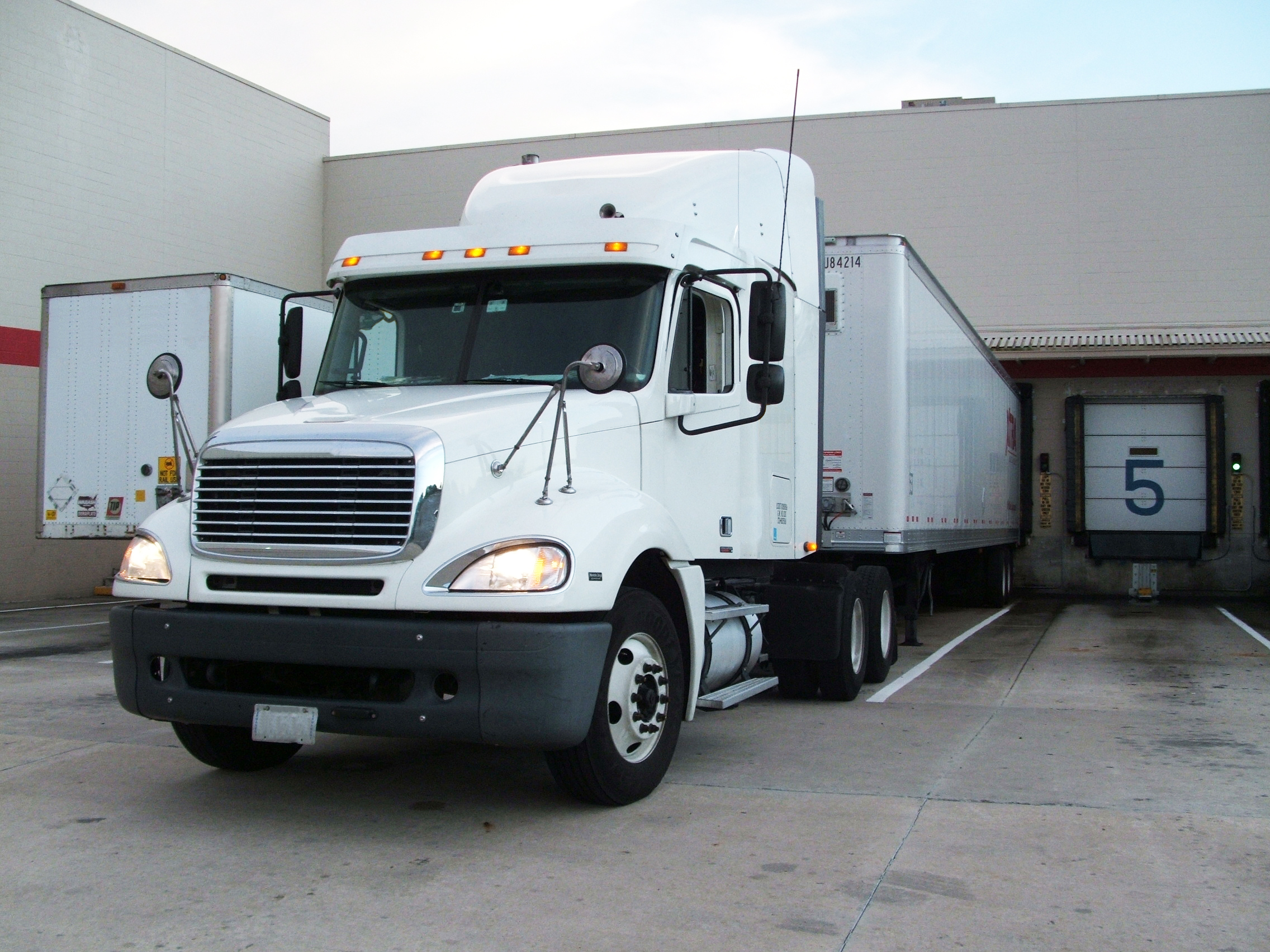
by logisticsplus | Feb 16, 2016 | News
 When you ship less than truckload (LTL) shipments, it is common to request an LTL freight quote from one or more carriers, or from third-party logistics (3PL) companies (sometimes referred to as brokers). Shippers that need LTL freight services are typically going to evaluate their options according to the following needs:
When you ship less than truckload (LTL) shipments, it is common to request an LTL freight quote from one or more carriers, or from third-party logistics (3PL) companies (sometimes referred to as brokers). Shippers that need LTL freight services are typically going to evaluate their options according to the following needs:
- Cost. What are the total freight charges and how does this compare to my other options?
- Speed. How quickly does my shipment need to deliver to my customer (outbound) or to me (inbound)?
- Reliability. How important is it that my shipment be delivered exactly on the date specified?
- Value. How susceptible is my shipment to being lost or damaged, and what are the ramifications if it is?
- Convenience. How much time do I have to evaluate my carrier options, schedule my pickup, prepare my bill of lading, track my shipment, etc.?
For the most accurate freight quote, at a bare minimum you will need to provide your carrier or 3PL with your intended pickup date, origin postal/zip code, destination postal/zip code, weight of the shipment, and the freight class (or a description of the commodity being shipped if you are unsure of your freight classification). Depending upon the size or characteristics of your shipment, you may also need to provide your shipment dimensions (length x width x height) so that your shipment’s freight density can be determined. Shipments that are unusually large, but not overly heavy, will often be susceptible to accessorial rules or fees beyond or in lieu of normal LTL freight charges.
After you have received your LTL freight quote (or quotes), you’ll need to determine if you want to go with the lowest cost carrier or, perhaps, another carrier if one carrier’s speed (i.e., transit time) is faster than the lowest cost carrier. If a specific delivery date or time is extremely important to you, you may consider upgrading to a guaranteed service option if available (many carriers offer end of day, early morning, or time-definite guaranteed service options).
There are many variables that go into LTL rate quotes, so don’t concern yourself with “base rates” and “discounts” as the only real figure you should be focused on is the “net price” that you’re being quoted (you can read our What Factors Impact LTL Rates article for more detail on everything that goes into LTL freight quotes).
If the value of your shipment is important, you will want to understand each carriers’ “limited liability” amounts, i.e., how much they will reimburse you on a freight claim if your shipment is lost or damaged as a result of their fault or negligence. Typical liability amounts are anywhere from $10 to $25 per pound, but can often be less if you’re shipping used articles or if you’re shipping cross-border between The U.S., Mexico or Canada. If the carrier liability amount is unacceptable, you can oftentimes purchase additional insurance (sometimes referred to as “excess value liability” or “ad valorem” coverage) directly through the carrier or 3PL for a nominal cost.
In many cases, there are some good reasons why you might work with a 3PL for your LTL freight quotes versus going directly to the carriers. These benefits include:
- Multiple carrier quotes and service options with a single request. Many 3PLs have been able to use their buying leverage to negotiate great rates with dozens of carriers. Therefore, you’ll get the convenience of numerous carrier rates and service options through a single request (versus having to call multiple carriers or visit multiple carrier websites).
- LTL freight shipping expertise and customer service. Many 3PLs have years of expertise working with LTL shipments and LTL carriers. They’ll be able to provide you with guidance as to which carriers have the best performance records for reliability and safety. A good 3PL can also help you prepare your bill of lading, schedule your shipment, proactively track your shipment, and then go to bat for you if there is a service delay or damage issue.
- Transportation management systems (TMS) and technology. Many 3PLs can provide you with some great online tools that allow you to self-service your needs (like our eShipPlus™ platform), including instant online LTL rate quotes for multiple carriers, automatically preparing bills of lading, electronically scheduling carrier pickups, freight bill auditing and consolidated invoices, shipment manifests and reports, and more.
If you’re ready to work with one of the most reputable 3PLs in the industry for your LTL shipping needs (after all, we were named a Top 50 Freight Brokerage Firm and a Great Supply Chain Partner this past year), then click the button below to get started. We’d love to show you our passion for excellence one shipment at a time!

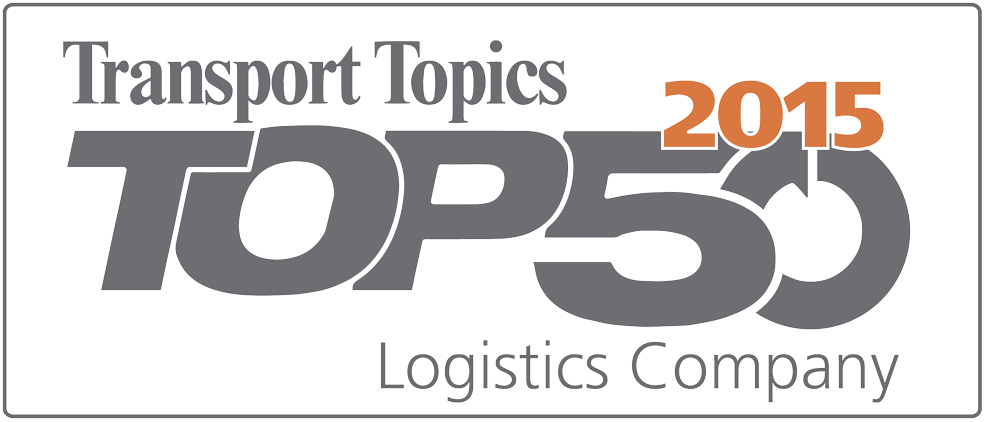
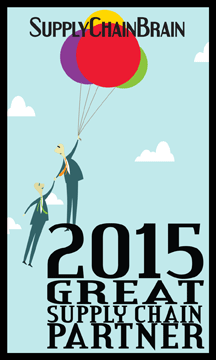
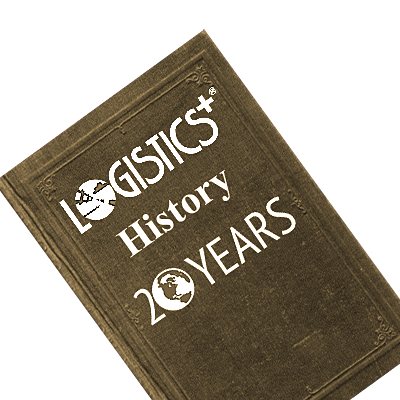
by logisticsplus | Feb 12, 2016 | News
 As we celebrate our 20th year of business, we continue our walk down memory lane by sharing the following Times Erie-News newspaper clipping from December 11, 2005. This article profiles one of Erie’s fastest-growing businesses: Logistics Plus, of course (you can click the news clipping below to view a slightly larger image).
As we celebrate our 20th year of business, we continue our walk down memory lane by sharing the following Times Erie-News newspaper clipping from December 11, 2005. This article profiles one of Erie’s fastest-growing businesses: Logistics Plus, of course (you can click the news clipping below to view a slightly larger image).
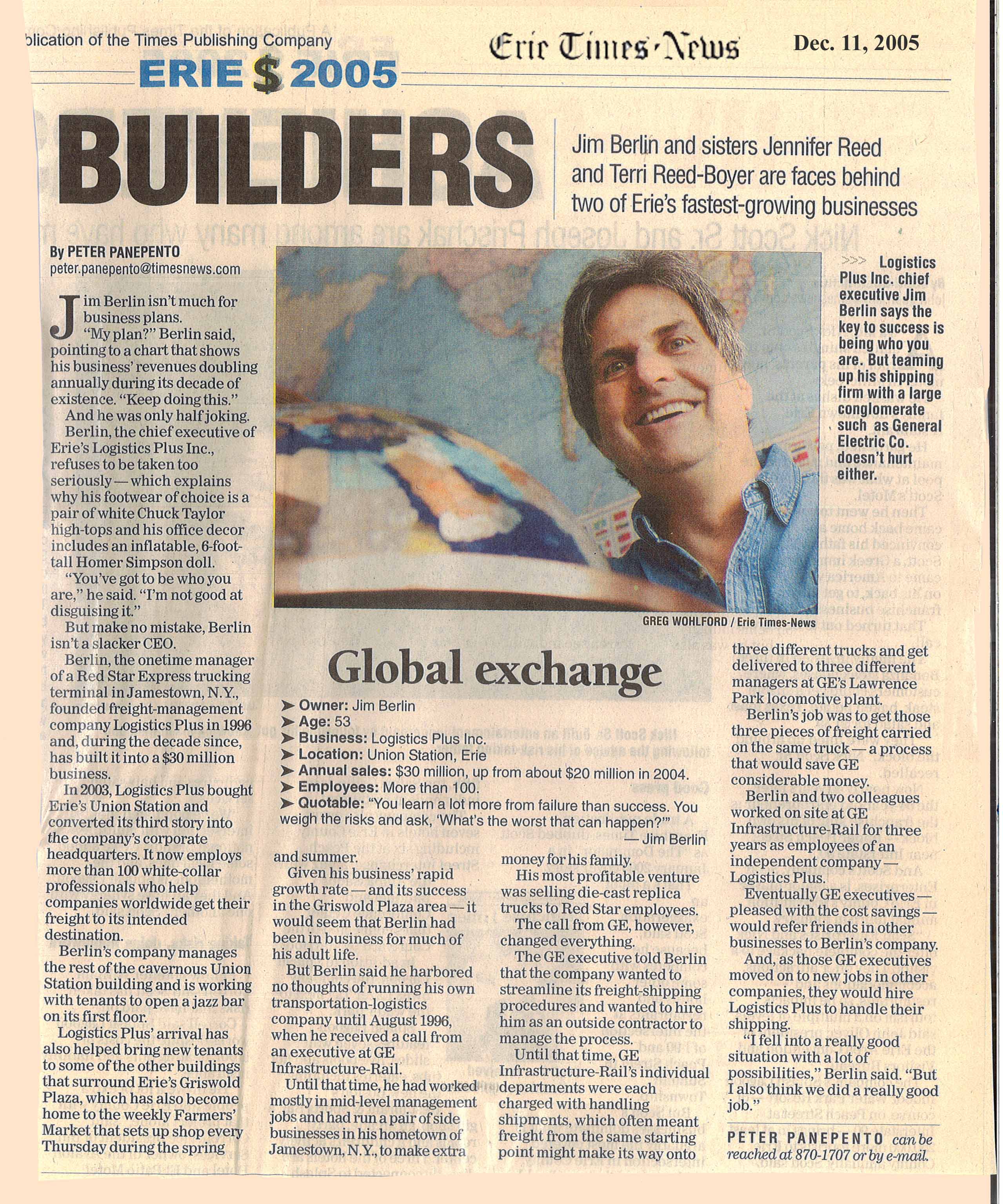

by Scott Frederick | Feb 5, 2016 | News
 On January 6, 2016, Jim Berlin, founder and CEO of Logistics Plus, was a guest speaker at the Rotary Club of Erie. With some help from our friends at WP$E radio, here is an edited audio replay of that presentation (along with the slides that were shown that day).
On January 6, 2016, Jim Berlin, founder and CEO of Logistics Plus, was a guest speaker at the Rotary Club of Erie. With some help from our friends at WP$E radio, here is an edited audio replay of that presentation (along with the slides that were shown that day).
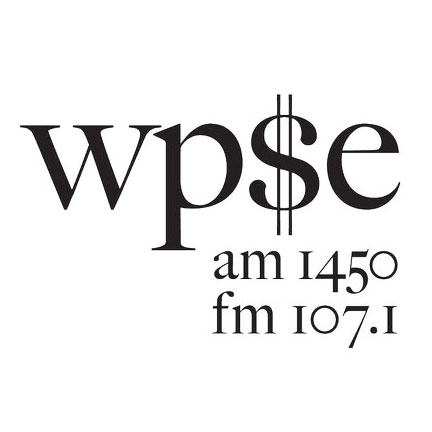
by Scott Frederick | Feb 5, 2016 | News
 Logistics Plus media partner, WP$E radio, continues to air short audio clips from Jim Berlin and others within the company as part of their business programming. WP$E AM 1450/FM 107.1 is a commercially licensed radio station serving Erie County, Pennsylvania. The station is owned by the Penn State Board of Trustees, and it is operated by Penn State Behrend, under the direction of professional broadcast staff. In addition to providing a round-the-clock, one-stop source for global and financial news, WP$E also airs ongoing commentaries by regional business leaders, WJET-TV Action News simulcasts, and NFL, NCAA, and Penn State sports broadcasts from Dial Global and the Penn State Sports Network.
Logistics Plus media partner, WP$E radio, continues to air short audio clips from Jim Berlin and others within the company as part of their business programming. WP$E AM 1450/FM 107.1 is a commercially licensed radio station serving Erie County, Pennsylvania. The station is owned by the Penn State Board of Trustees, and it is operated by Penn State Behrend, under the direction of professional broadcast staff. In addition to providing a round-the-clock, one-stop source for global and financial news, WP$E also airs ongoing commentaries by regional business leaders, WJET-TV Action News simulcasts, and NFL, NCAA, and Penn State sports broadcasts from Dial Global and the Penn State Sports Network.
Here are a few recent clips that were recorded and aired on the radio (click image to listen):

Local Internships

Word-of-Mouth Marketing

You Get All of Us

New MBA Logistics Program












 On January 6, 2016,
On January 6, 2016, 

